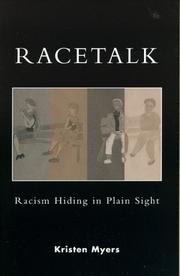| Listing 1 - 10 of 188 | << page >> |
Sort by
|
Book
Year: 1863 Publisher: Philadelphia : J.B. Robinson,
Abstract | Keywords | Export | Availability | Bookmark
 Loading...
Loading...Choose an application
- Reference Manager
- EndNote
- RefWorks (Direct export to RefWorks)
Book
ISBN: 3964569097 8491921036 Year: 2020 Publisher: Madrid : Iberoamericana Editorial Vervuert,
Abstract | Keywords | Export | Availability | Bookmark
 Loading...
Loading...Choose an application
- Reference Manager
- EndNote
- RefWorks (Direct export to RefWorks)
La “mezcla” entre población de ascendencia indígena, africana, europea y asiática ha sido un elemento importante en la formación de las sociedades latinoamericanas. Este proceso histórico se ha denominado comúnmente mestizaje. Hay una enorme variedad en la importancia que se le ha asignado en los diversos países, desde la exaltación de la “raza cósmica” en México pasando por el silenciamiento de la ascendencia indígena en Argentina y Brasil, y una tendencia general de ocultar la herencia africana en Hispanoamérica. Este libro traza las sendas del mestizaje en una variedad de países desde el siglo XVI hasta el XIX con énfasis en la época colonial. Se centra en la «mezcla» y las relaciones entre personas de diferentes grupos y categorías desde el seno de la familia, acentuando la cuestión del honor e integrando también aspectos legales, fiscales, demográficos y económicos. La obra supone un ambicioso esfuerzo de reflexión polifónica de investigadores americanos y europeos, tanto jóvenes como experimentados.
Miscegenation --- History. --- Miscegenation (Racist theory)
Book
Year: 1965 Publisher: Madrid : Editora Nacional,
Abstract | Keywords | Export | Availability | Bookmark
 Loading...
Loading...Choose an application
- Reference Manager
- EndNote
- RefWorks (Direct export to RefWorks)
Miscegenation --- Métissage --- Miscegenation (Racist theory)
Book
ISBN: 2348061074 270717873X Year: 2007 Publisher: Paris (9bis, rue Abel Hovelacque 75013) : La Découverte,
Abstract | Keywords | Export | Availability | Bookmark
 Loading...
Loading...Choose an application
- Reference Manager
- EndNote
- RefWorks (Direct export to RefWorks)
Pendant la colonisation française, des dizaines de milliers d'enfants sont nés d'« Européens » et d'« indigènes ». Souvent illégitimes, non reconnus puis abandonnés par leur père, ces métis furent perçus comme un danger parce que leur existence brouillait la frontière entre « citoyens » et « sujets » au fondement de l'ordre colonial. Leur situation a pourtant varié : invisibles en Algérie, ils ont été au centre des préoccupations en Indochine. La « question métisse » a également été posée à Madagascar, en Afrique et en Nouvelle-Calédonie. Retraçant l'histoire oubliée de ces enfants de la colonie, cet ouvrage révèle une face cachée, mais fondamentale, de l'histoire de l'appartenance nationale en France : il montre comment les tentatives d'assimilation des métis ont culminé, à la fin des années 1920, avec des décrets reconnaissant la citoyenneté à ceux qui pouvaient prouver leur « race française ». Aux colonies, la nation se découvrait sous les traits d'une race. Cette législation bouleversa le destin de milliers d'individus, passant soudainement de la sujétion à la citoyenneté : ainsi, en Indochine, en 1954, 4 500 enfants furent séparés de leur mère et « rapatriés » en tant que Français. Surtout, elle introduisait la race en droit français, comme critère d'appartenance à la nation. Cela oblige à revoir le « modèle républicain » de la citoyenneté, fondé sur la figure d'un individu abstrait, adhérant volontaire à un projet politique commun et à souligner les liens entre filiation, nationalité et race. (Cette édition numérique reprend, à l'identique, l'édition originale de 2007.)
France --- Colonies --- History. --- Multiracial people --- Miscegenation (Racist theory)
Book
Year: 1964 Publisher: Boston : Beacon Press,
Abstract | Keywords | Export | Availability | Bookmark
 Loading...
Loading...Choose an application
- Reference Manager
- EndNote
- RefWorks (Direct export to RefWorks)
Intermarriage --- Miscegenation --- Mariage mixte --- Métissage --- Miscegenation (Racist theory)
Book
Year: 1943 Publisher: Dresden : L. Ehlermann,
Abstract | Keywords | Export | Availability | Bookmark
 Loading...
Loading...Choose an application
- Reference Manager
- EndNote
- RefWorks (Direct export to RefWorks)
Miscegenation --- Heredity --- Métissage --- Hérédité --- Miscegenation (Racist theory)
Book
ISBN: 1603062009 Year: 2013 Publisher: Montgomery : NewSouth Books,
Abstract | Keywords | Export | Availability | Bookmark
 Loading...
Loading...Choose an application
- Reference Manager
- EndNote
- RefWorks (Direct export to RefWorks)
Miscegenation --- Mestizaje. --- Racially mixed people --- Miscegenation (Racist theory) --- Multiracial people
Book
ISBN: 9782753512641 2753512647 2753567824 Year: 2011 Publisher: Rennes : Presses universitaires de Rennes,
Abstract | Keywords | Export | Availability | Bookmark
 Loading...
Loading...Choose an application
- Reference Manager
- EndNote
- RefWorks (Direct export to RefWorks)
Paraguayan War, 1865-1870 --- Miscegenation --- Guerre du Paraguay, 1865-1870 --- Métissage --- Miscegenation (Racist theory)

ISBN: 0742535339 1461641675 9781461641674 9780742535336 0742535347 9780742535343 1299805671 Year: 2005 Publisher: Lanham, Md. Rowman & Littlefield Publishers
Abstract | Keywords | Export | Availability | Bookmark
 Loading...
Loading...Choose an application
- Reference Manager
- EndNote
- RefWorks (Direct export to RefWorks)
Drawing on over 600 incidents of racetalk among whites, blacks, Latinos, and Asians, this book examines private racism. Using a dialectical analysis, this book examines the ways that everyday people help to reproduce racism through their common interactions.
Racism in language. --- Language and racism --- Racism and language --- Racist language --- Language and languages
Book
Year: 1931 Volume: 13, no 1 Publisher: Cambridge, Mass. : Published by the Bureau of International Research of Harvard University and Radcliff College for the Museum,
Abstract | Keywords | Export | Availability | Bookmark
 Loading...
Loading...Choose an application
- Reference Manager
- EndNote
- RefWorks (Direct export to RefWorks)
Indians of Mexico --- Miscegenation --- Métissage --- Mixed descent --- Yucatán (Mexico : State) --- Population --- Miscegenation (Racist theory)
| Listing 1 - 10 of 188 | << page >> |
Sort by
|

 Search
Search Feedback
Feedback About UniCat
About UniCat  Help
Help News
News